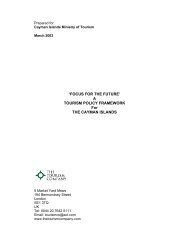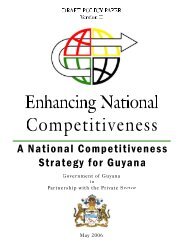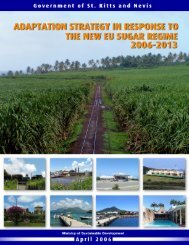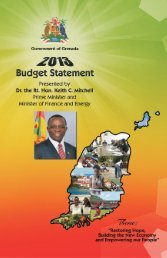Focus on Barbados Budget 2005/2006
Focus on Barbados Budget 2005/2006 - Caribbean Elections
Focus on Barbados Budget 2005/2006 - Caribbean Elections
- No tags were found...
Create successful ePaper yourself
Turn your PDF publications into a flip-book with our unique Google optimized e-Paper software.
TAX A DVISORY S ERVICES<br />
J ANUARY <strong>2006</strong><br />
<str<strong>on</strong>g>Focus</str<strong>on</strong>g> <strong>on</strong> <strong>Barbados</strong><br />
<strong>Budget</strong> <strong>2005</strong>/<strong>2006</strong>
B UDGET <strong>2005</strong>/<strong>2006</strong> ECONOMIC A NALYSIS
<strong>Barbados</strong> Ec<strong>on</strong>omic Proposals<br />
<strong>2005</strong>/<strong>2006</strong><br />
The <strong>Barbados</strong> Ec<strong>on</strong>omic Proposals<br />
<strong>2005</strong>/<strong>2006</strong> is based <strong>on</strong> the Ec<strong>on</strong>omic Policy<br />
Statement delivered by the Prime Minister<br />
and Minister of Finance,<br />
the Right H<strong>on</strong>. Owen S. Arthur, M.P.,<br />
in the House of Assembly <strong>on</strong><br />
M<strong>on</strong>day 16th January, <strong>2006</strong>.<br />
This review was prepared by<br />
Ernst & Young and is intended for the<br />
informati<strong>on</strong> of our clients and associates.<br />
Ernst & Young Caribbean<br />
Worthing, Christ Church,<br />
<strong>Barbados</strong>, W. I.<br />
Tel: (246) 430-3900 Fax: (246) 430-2079<br />
Email: ey.caribbean@tt.ey.com<br />
Website: www.ey.com/caribbean<br />
January 17, <strong>2006</strong>
Ernst & Young Caribbean<br />
Our Global Visi<strong>on</strong><br />
Ernst & Young c<strong>on</strong>tributes to the success of people and clients by creating value and<br />
c<strong>on</strong>fidence. With extensive business knowledge and hands-<strong>on</strong> industry experience we help<br />
companies capture growth, improve financial performance and manage risk - anywhere in the<br />
world.<br />
Our Caribbean Missi<strong>on</strong><br />
To be the leading professi<strong>on</strong>al services firm in the Caribbean providing through our people<br />
power, high quality, customised, innovative and integrated approaches, which create<br />
significant value for our clients.<br />
We are a fully integrated Caribbean firm organised al<strong>on</strong>g specialised service and industry<br />
lines. We have a single governance structure and all our strategies are guided by a shared<br />
visi<strong>on</strong>.<br />
We provide integrated service delivery - coordinated, seamless services from various<br />
disciplines, enabled by our account management approach, which means that clients have a<br />
single account service representative proactively coordinating the delivery of relevant<br />
services by our entire team.<br />
We are innovators and agents of change investing c<strong>on</strong>siderable energy and resources in<br />
knowledge creati<strong>on</strong> and management and the exchange of informati<strong>on</strong> as well as its<br />
communicati<strong>on</strong> to our clients and to the wider business community.<br />
B UDGET <strong>2005</strong>/<strong>2006</strong> ECONOMIC A NALYSIS
Table of C<strong>on</strong>tents<br />
Page<br />
Oil Prices And The Barbadian Ec<strong>on</strong>omy 1<br />
Legacy Benefits of Hosting ICC Cricket World Cup 2007 5<br />
Amalgamati<strong>on</strong>s Under The Value Added Tax Regime 8<br />
Business Facilitati<strong>on</strong>: Time to Put Words into Acti<strong>on</strong> 10
Oil Prices and the Barbadian<br />
Ec<strong>on</strong>omy<br />
Introducti<strong>on</strong><br />
The recent increases in the price of oil has come as a shock to Barbadian businesses and is<br />
reminiscent of the oil price shock experienced in the late 1970s early 1980s. Then the average<br />
price of oil rose from $26 per barrel to $60 per barrel in 1979 and reached as high as $80 per<br />
barrel in 1980. This resulted in unprecedented levels of inflati<strong>on</strong> in <strong>Barbados</strong>. For example,<br />
in 1978, the average rate of retail price inflati<strong>on</strong> was approximately 11 percent and in 1979 it<br />
reached 16 percent. Government's fiscal balance went from -3.2 percent in 1978 to -3.9<br />
percent in 1979 and -5.8 percent in 1980.<br />
While part of this deteriorati<strong>on</strong> was due to other factors such as rising expenditure <strong>on</strong> wages<br />
and salaries and transfers and subsidies, the worsening in government's fiscal accounts<br />
occurred principally through lower government revenue due to minor tax changes. The goods<br />
balance <strong>on</strong> the external current account rose by 7 percentage points to 40.5 percent of GDP,<br />
as fuel imports more than quadrupled. Therefore, <strong>on</strong> the basis of past experience, it is clear<br />
that the recent increases in the price of oil will most likely impact <strong>on</strong> inflati<strong>on</strong> and the external<br />
balance of <strong>Barbados</strong>.<br />
The most recent rises in internati<strong>on</strong>al oil prices can be attributed to three major factors: str<strong>on</strong>g<br />
demand, supply c<strong>on</strong>straints and speculators. With the three major industrial ec<strong>on</strong>omies - the<br />
US, Japan and Europe - coming out of an ec<strong>on</strong>omic slowdown and as China and the other<br />
Asian countries employ a greater amount of oil to power their manufacturing and expanding<br />
car markets, the Internati<strong>on</strong>al Energy Agency (IEA) estimates that in 2004 world oil demand<br />
rose by the greatest amount in 24 years.<br />
Unfortunately, supply is struggling to keep pace with demand. New product investment in<br />
particular has been disappointing. Whereas between 1996 and 2004 an average of 11.4 billi<strong>on</strong><br />
additi<strong>on</strong>al barrels of oil was found per year, <strong>on</strong>ly 6.8 billi<strong>on</strong> per year was retrieved between<br />
2001 and 2003. Added to this, supplies from Iraq have c<strong>on</strong>tinued to be low due to terrorists'<br />
attacks, major producers such as Nigeria and Venezuela have had to cope with political<br />
unrests and strikes, and producti<strong>on</strong> from the Gulf of Mexico has been cut due to the effects of<br />
hurricane Ivan and more recently, Katrina. This propensity for sudden price changes has also<br />
opened the door for hedge funds and other speculators. However, by betting <strong>on</strong> the possibility<br />
of higher prices these investors have themselves exerted upward price pressures <strong>on</strong> the<br />
market.<br />
1 B UDGET <strong>2005</strong>/<strong>2006</strong> ECONOMIC A NALYSIS
How Do Oil Prices Affect the Ec<strong>on</strong>omy?<br />
Effects <strong>on</strong> Inflati<strong>on</strong><br />
There is a str<strong>on</strong>g link between oil prices and domestic inflati<strong>on</strong> in most countries. Rising oil<br />
prices have a direct impact <strong>on</strong> domestic inflati<strong>on</strong> through increases in the costs of electricity<br />
and the price of fuel at the pump. However, oil prices also indirectly influence inflati<strong>on</strong><br />
through higher prices of imported and domestically produced goods and services.<br />
The larger the share of energy products such as fuels, electricity and gas in c<strong>on</strong>sumpti<strong>on</strong><br />
expenditure the larger the direct impact <strong>on</strong> the retail price index (RPI). At present, the weights<br />
attached to energy products in the calculati<strong>on</strong> of the RPI in <strong>Barbados</strong> suggest that they<br />
account for 11.3% (6.3% from fuel and light and 5% from petrol and oils) of total<br />
c<strong>on</strong>sumpti<strong>on</strong>. Therefore, if the domestic price of energy products rises by 10%; overall<br />
inflati<strong>on</strong> would increase by just 1.1% assuming all other factors remain c<strong>on</strong>stant.<br />
Changes in oil prices also have an indirect effect <strong>on</strong> the RPI, as the prices of those goods and<br />
services that use energy in their producti<strong>on</strong> process will also react to the increased cost of<br />
energy. For example, rising petroleum prices tend to push-up the cost of animal feeds which<br />
in turn raises the cost of meats and derived products. However, given that the price of fuel at<br />
the pump is regulated, the full impact of the change in energy prices is not usually passed <strong>on</strong><br />
to c<strong>on</strong>sumers. Nevertheless, it is anticipated that the most recent oil price increases will add<br />
a further BDS$33m per annum to the costs of the transportati<strong>on</strong> industry.<br />
Domestic inflati<strong>on</strong> is also subject to sec<strong>on</strong>d tier or indirect effects. These sec<strong>on</strong>d tier effects<br />
occur as rising c<strong>on</strong>sumer and producer energy prices result in a rise in the general price level<br />
for n<strong>on</strong>-energy goods and services. These sec<strong>on</strong>d tier effects produce c<strong>on</strong>temporaneous as<br />
well as lagged effects <strong>on</strong> the remaining comp<strong>on</strong>ents of the RPI. However, in general most of<br />
these delayed effects tend to occur <strong>on</strong>e year after the rise in oil prices due to the existence of<br />
Government price c<strong>on</strong>trols.<br />
Effects of Oil Prices <strong>on</strong> GDP and Other Macroec<strong>on</strong>omic Variables<br />
Simulati<strong>on</strong>s undertaken by the Central Bank of <strong>Barbados</strong> suggest that a US$20 per barrel rise<br />
in crude prices would reduce GDP in <strong>Barbados</strong> by about 2 percentage points or around $100<br />
milli<strong>on</strong> (US $50 milli<strong>on</strong>) and increase domestic inflati<strong>on</strong> by around 0.5 percentage points.<br />
From the producti<strong>on</strong> side, rising oil prices lower value-added, especially for oil-intensive<br />
2
industries such as manufacturing and utilities, and to a lesser extent tourism, since it augments<br />
the costs of inputs used by firms. From the expenditure side, the rise in energy prices implies<br />
that c<strong>on</strong>sumers now have less to spend <strong>on</strong> other goods and services after paying more cash at<br />
the pump and <strong>on</strong> other energy related bills.<br />
Government's fiscal outturn is also likely to worsen somewhat, as the reducti<strong>on</strong> in GDP leads<br />
to a slowdown in tax revenue growth, while spending <strong>on</strong> some public services could climb<br />
(for example, the Transport Board and the <strong>Barbados</strong> Nati<strong>on</strong>al Oil Terminal). Overall, the<br />
fiscal balance should worsen by between 1.0 - 1.5 percent of GDP. At the same time, the rise<br />
in the amount of foreign exchange required to purchase the same amount of imported energy<br />
leads to a deteriorati<strong>on</strong> in the external current account and a loss of foreign exchange reserves.<br />
The external current account is likely to deteriorate by between 1.5 and 2.5 percent of GDP,<br />
principally due to greater spending <strong>on</strong> fuels and reduced travel receipts. Overall liquidity in<br />
the banking system could rise as new credit could be negatively impacted due to the greater<br />
perceived risk <strong>on</strong> the part of the commercial banking industry.<br />
Industry-Specific Issues<br />
Manufacturing<br />
Fuel and raw materials are the two largest expenditure categories for most manufacturing<br />
establishments. For example, in the producti<strong>on</strong> of soft drinks most of the costs arise from<br />
sugar, water, syrup and electricity. Labour is principally employed for administrati<strong>on</strong>,<br />
inspecti<strong>on</strong> and transportati<strong>on</strong>. Some larger manufacturing firms have been using their own<br />
generators for a while now which run <strong>on</strong> so-called 'dirty oil'. This technique was first<br />
employed by the Arawak Cement Company Ltd. to cut costs and is also used by Roberts.<br />
Obviously, generators involve a relatively large capital outlay, but it is an area being<br />
investigated by a number of companies, as the gains from using the generators could offset<br />
upfr<strong>on</strong>t costs.<br />
Tourism<br />
For most businesses in the tourism sector electricity and gas costs represent 15 percent of total<br />
expenditure compared to 25 percent for labour. Given this proporti<strong>on</strong>, a rise in energy prices<br />
would definitely have an impact <strong>on</strong> the profitability of most hotels and restaurants.<br />
3 B UDGET <strong>2005</strong>/<strong>2006</strong> ECONOMIC A NALYSIS
C<strong>on</strong>clusi<strong>on</strong>s<br />
Although there still remains a risk that the current high level of oil prices could be maintained<br />
or increased further, most analysts think that this is unlikely. The IMF, in their most recent<br />
World Ec<strong>on</strong>omic Outlook are projecting that average crude prices in <strong>2006</strong> would be about<br />
US$61 per barrel compared to US$54 per barrel in <strong>2005</strong>. The impact <strong>on</strong> <strong>Barbados</strong>, if prices<br />
instead rise by a further US$20 per barrel in <strong>2006</strong>, would be negative, but not as severe as that<br />
experienced in the late 1970s and early 1980s. Energy c<strong>on</strong>sumpti<strong>on</strong> as a ratio to GDP has<br />
fallen since this period, as energy savings have occurred due to the transiti<strong>on</strong> from a<br />
manufacturing-based ec<strong>on</strong>omy to <strong>on</strong>e in which services are predominant and advances in<br />
technology has led to energy savings in the home.<br />
The initiatives announced by the Minister of Finance in his recent Ec<strong>on</strong>omic Statement are<br />
well thought out and will be an important comp<strong>on</strong>ent in <strong>Barbados</strong>'s strategy for minimising<br />
the effects of high oil prices <strong>on</strong> the Barbadian ec<strong>on</strong>omy.<br />
4
Legacy Benefits of Hosting ICC<br />
Cricket World Cup 2007<br />
ICC Cricket World Cup (CWC) is the third largest internati<strong>on</strong>al sporting event. In 2007, the<br />
event will take place across nine Caribbean territories and is estimated to be viewed by 2.2<br />
billi<strong>on</strong> people around the world.<br />
It is no small feat for <strong>Barbados</strong> as the smallest country to ever host the Finals of the biggest<br />
cricket event in the world and it will take significant investment to meet the required<br />
internati<strong>on</strong>al standards to cater to the thousands of visitors to our shores and to satisfy and<br />
exceed the expectati<strong>on</strong>s of the qualifying teams, match officials, sp<strong>on</strong>sors and the event<br />
owners, the Internati<strong>on</strong>al Cricket Council (ICC).<br />
Our initial ec<strong>on</strong>omic assessment made it quite clear from the outset that the investment will<br />
never be justified by the spend during those 50 to 60 days of cricket during March and April<br />
2007. But when the legacy benefit is taken into account, there is absolute c<strong>on</strong>sensus that<br />
<strong>Barbados</strong> and the regi<strong>on</strong> could easily see the returns <strong>on</strong> expenditure.<br />
The c<strong>on</strong>cept of legacy benefit is not an academic exercise and has become the determining<br />
factor for such fierce bidding am<strong>on</strong>g countries vying for the opportunity to host a world<br />
games.<br />
For cities like Barcel<strong>on</strong>a and Sydney, research shows significant effect <strong>on</strong> tourism following<br />
their hosting of the Summer Olympics in 1992 and 2000 respectively:<br />
(a) Barcel<strong>on</strong>a's tourism arrivals have risen by a cumulative 129% since the Olympics<br />
and<br />
(b) Sydney saw increases in its tourism receipts of 7% in the years following the<br />
Games<br />
The legacy benefits however do go far bey<strong>on</strong>d tourism and actually touch a wide range of<br />
ec<strong>on</strong>omic sectors. Again the Sydney Olympics is an excellent example of extracting great<br />
l<strong>on</strong>g-term benefits from hosting a major sporting event. The Games reportedly gave Australia<br />
a multi-billi<strong>on</strong> dollar boost to infrastructure development, tourism and c<strong>on</strong>venti<strong>on</strong> business,<br />
internati<strong>on</strong>al media exposure, and new business estimated to be worth more than Aus$6.5bn<br />
in ec<strong>on</strong>omic activity over a 12-year period.<br />
Tangibly the Games delivered substantial business and ec<strong>on</strong>omic returns to Sydney, New<br />
South Wales and Australia, including:<br />
5 B UDGET <strong>2005</strong>/<strong>2006</strong> ECONOMIC A NALYSIS
• $3 billi<strong>on</strong> in business outcomes including $600m in new business investment<br />
• Injecti<strong>on</strong> of $6b in infrastructure developments in New South Wales<br />
• Injecti<strong>on</strong> of $1.2b worth of c<strong>on</strong>venti<strong>on</strong> business for New South Wales between<br />
1993 and 2007<br />
• Greatly enhanced business profile<br />
• Greater expertise and c<strong>on</strong>fidence in tendering, both domestically and overseas <strong>on</strong><br />
large scale projects<br />
Barcel<strong>on</strong>a, another best practice model, reportedly achieved 50 years of infrastructure<br />
improvements in just 8 years in areas such as the airport, road, sewage, and<br />
telecommunicati<strong>on</strong>s systems.<br />
In formulating <strong>Barbados</strong>' bid in early 2004, we determined that provided the legacy benefit is<br />
adequately derived, the return to <strong>Barbados</strong> lies in the regi<strong>on</strong> of 4 to 5 times the investment<br />
made.<br />
In keeping with <strong>Barbados</strong>' strategic approach to hosting the Cricket World Cup 2007, a<br />
Legacy Committee has been put in place, boasting some of <strong>Barbados</strong>' most distinguished<br />
minds drawn from a wide cross secti<strong>on</strong> of the society and representative of the many<br />
stakeholders involved.<br />
The Committee's principal role is to develop a Legacy Plan which includes identifying<br />
compelling l<strong>on</strong>g-term strategic Legacy Targets for CWC 2007; developing an acti<strong>on</strong> plan for<br />
each target and engaging the key drivers or stakeholders in the process to ensure that the<br />
targets, made up of identified measurable outcomes, are realized in the agreed time frame.<br />
Through a collaborative dynamic brainstorming process the following l<strong>on</strong>g-term strategic<br />
Targets have been selected:<br />
Excellence in Sports / Health - investing in building <strong>on</strong> <strong>Barbados</strong>' internati<strong>on</strong>al reputati<strong>on</strong><br />
for cricket and sporting excellence and in developing existing and new sporting opportunities<br />
that can impact positively <strong>on</strong> health and can generate foreign exchange e.g. internati<strong>on</strong>al<br />
motor racing.<br />
6
Event <strong>Barbados</strong> - establishing <strong>Barbados</strong> as the Events Capital of the Caribbean for a wide<br />
range of Internati<strong>on</strong>al Events whether in medicine, sports, entertainment, arts and culture,<br />
business and educati<strong>on</strong> etc. <strong>Barbados</strong> was recently announced as the venue for the <strong>2006</strong> PGA<br />
Golf World Cup.<br />
Community Tourism - bringing tourists directly into the local communities to experience the<br />
"real" <strong>Barbados</strong> and to support the development of community entrepreneurship.<br />
Export <strong>Barbados</strong> - radically changing from an import mindset to an outward looking,<br />
export-oriented culture and investing and supporting all export activities and identifying and<br />
fast-tracking the development of new <strong>on</strong>es.<br />
Think <strong>Barbados</strong> - creating a Think Tank to leverage <strong>on</strong> the knowledge and expertise of<br />
Barbadians worldwide to create a source of new, leading-edge ideas for ec<strong>on</strong>omic and social<br />
development.<br />
Green <strong>Barbados</strong> - to engage all Barbadians in permanently transforming our Island into the<br />
clearest and most envir<strong>on</strong>mentally advanced country in the world.<br />
Quality of Life - development of a Quality of Life index, measuring the elements (e.g. crime<br />
rate, c<strong>on</strong>diti<strong>on</strong> of roads, health care, educati<strong>on</strong>, etc.) that are most important to Barbadians and<br />
that make the Island attractive for all residents and investors.<br />
Through a process of community outreach and discussi<strong>on</strong> the targets will be finalized and<br />
published early in <strong>2006</strong> and shared with all Barbadians so that there is nati<strong>on</strong>al buy-in and<br />
momentum to support the work pre and post-CWC 2007. These targets will closely underpin<br />
the country's Nati<strong>on</strong>al Strategic Plan <strong>2005</strong>-2025, entitled "Global Excellence, Barbadian<br />
Traditi<strong>on</strong>s" with a visi<strong>on</strong> to be "a fully developed society that is prosperous, socially just and<br />
globally competitive".<br />
L<strong>on</strong>g after the flurry of activity which 2007 promises, it is undoubtedly the legacy planning<br />
we have d<strong>on</strong>e that will become the crowning glory of this experience for generati<strong>on</strong>s.<br />
The most valuable and important but financially immeasurable legacy will be the social<br />
cohesi<strong>on</strong> created by involving as many Barbadians as possible in developing and helping to<br />
execute the Legacy Plan as part of a str<strong>on</strong>g collaborative Nati<strong>on</strong>al Team effort.<br />
7 B UDGET <strong>2005</strong>/<strong>2006</strong> ECONOMIC A NALYSIS
Amalgamati<strong>on</strong>s Under the<br />
Value Added Tax (VAT) Regime<br />
In today's competitive world, companies are coming to the realizati<strong>on</strong> that amalgamati<strong>on</strong> or<br />
mergers is fast becoming an opti<strong>on</strong> and for some, the <strong>on</strong>ly opti<strong>on</strong>, if they are to survive in<br />
today's business envir<strong>on</strong>ment. The Companies Act of <strong>Barbados</strong> provides for two or more<br />
businesses to amalgamate and c<strong>on</strong>tinue as <strong>on</strong>e company (Secti<strong>on</strong> 206 of the Act). The<br />
c<strong>on</strong>tinual existence of some businesses in <strong>Barbados</strong> depends to a great extent <strong>on</strong> mergers and<br />
these have been accomplished to the satisfacti<strong>on</strong> of the entities involved, thereby preserving<br />
jobs and the c<strong>on</strong>tinued existence of those businesses.<br />
However, adverse developments have taken place with respect to some recent amalgamati<strong>on</strong>s,<br />
which could have a negative impact <strong>on</strong> future amalgamati<strong>on</strong>s of businesses in <strong>Barbados</strong>.<br />
These developments pertain to the VAT treatment now being applied by the VAT office to the<br />
companies that are involved in mergers. Previously, such mergers were treated by the VAT<br />
office as the c<strong>on</strong>tinuance of a business in accordance with the provisi<strong>on</strong>s of Secti<strong>on</strong> 206 of the<br />
Companies Act, and are c<strong>on</strong>sistent with the treatment for income tax purposes. Now it appears<br />
that they are being treated as a supply of goods or services by the merging entities under either<br />
secti<strong>on</strong> 24 (sale of assets), 25 (cessati<strong>on</strong> of registrati<strong>on</strong>) or 26 (sale of a taxable activity) of the<br />
VAT Act.<br />
We are aware that, although every effort was made by the Barbadian authorities to introduce<br />
a relatively simple VAT regime, there will be occasi<strong>on</strong>s when grey areas will arise and,<br />
because of this, administrators of this tax system would be faced with difficult decisi<strong>on</strong>s. Such<br />
decisi<strong>on</strong>s are generally based <strong>on</strong> prudence and c<strong>on</strong>servatism and therefore not generally in the<br />
favour of the tax payer. However, we view this particular diversi<strong>on</strong> from the established tax<br />
treatment applied to amalgamati<strong>on</strong>s as an unnecessary burden to the restructuring efforts of<br />
the business sector.<br />
Implicati<strong>on</strong>s of new method of addressing amalgamati<strong>on</strong>s<br />
Previously, <strong>on</strong> the amalgamati<strong>on</strong> of two or more companies, the new company (Newco)<br />
would be registered for VAT and, although having a new VAT registrati<strong>on</strong> number, would<br />
submit its VAT returns <strong>on</strong> the basis of the informati<strong>on</strong> in the records of the companies that<br />
were amalgamated. Subsequent returns would then be submitted based <strong>on</strong> Newco's bim<strong>on</strong>thly<br />
financial data. Once Newco has been registered for VAT purposes, the VAT<br />
registrati<strong>on</strong>s of the predecessor companies were cancelled without any further VAT<br />
implicati<strong>on</strong>s.<br />
The new VAT treatment regards the amalgamati<strong>on</strong> as a supply for VAT purposes with Newco<br />
being the recipient of the supply and the disappearing companies being the suppliers.<br />
Apparently, the decisi<strong>on</strong> to assess the amalgamating companies for output tax is based <strong>on</strong> the<br />
assumpti<strong>on</strong> that a supply of goods takes place <strong>on</strong> an amalgamati<strong>on</strong>. This VAT treatment for<br />
8
amalgamati<strong>on</strong>s will often result in a significant output tax liability for the companies involved<br />
in the amalgamati<strong>on</strong> and an equally large input tax credit for Newco. This is particularly the<br />
case where a large stock of inventory is kept by the companies c<strong>on</strong>cerned and will create<br />
severe cash flow difficulties for these companies. We do believe that the VAT treatment with<br />
respect to amalgamati<strong>on</strong>s previously adopted by the VAT office was correct because there is<br />
no sale, transfer or other dispositi<strong>on</strong> of the assets of the companies involved in the merger. It<br />
should be noted also that these companies do not issue invoices in these transacti<strong>on</strong>s and that<br />
there is no exchange of goods.<br />
It is our view that this new positi<strong>on</strong> taken by the VAT authorities is not c<strong>on</strong>ducive to the<br />
advancement of business in <strong>Barbados</strong>. Furthermore it will not enhance Government's revenue<br />
intake since, in the case of the merger of registrants, it will simply be a case of companies<br />
having to borrow (and incur additi<strong>on</strong>al interest expense) to pay the output tax and another<br />
company recovering the tax as input tax. It should be noted that the general tendency is for<br />
companies involved in similar types of business to merge thereby minimizing government's<br />
VAT exposure. For example, registrants such as wholesalers and retailers merge with<br />
companies making similar taxable supplies. Similarly, n<strong>on</strong>-registrants such as financial<br />
instituti<strong>on</strong>s and medical entities merge with entities in their respective groupings thus<br />
maintaining the status quo of providers of exempt supplies. In the unlikely event that a<br />
company making taxable supplies were to merge with <strong>on</strong>e making exempt supplies<br />
government would still not be disadvantaged because of the apporti<strong>on</strong>ment provisi<strong>on</strong>s of<br />
secti<strong>on</strong> 48 (1) (b) (iii) of the VAT Act.<br />
This matter has now become <strong>on</strong>e of grave c<strong>on</strong>cern for the business sector and requires an<br />
immediate resoluti<strong>on</strong>.<br />
9 B UDGET <strong>2005</strong>/<strong>2006</strong> ECONOMIC A NALYSIS
Business Facilitati<strong>on</strong>:<br />
Time to Put Words into Acti<strong>on</strong><br />
In his presentati<strong>on</strong> of the 2004 Ec<strong>on</strong>omic and Financial Policy Statement, The Right<br />
H<strong>on</strong>ourable Owen Arthur c<strong>on</strong>ceded that the bureaucratic processes within the public sector<br />
have impacted negatively <strong>on</strong> <strong>Barbados</strong>' business envir<strong>on</strong>ment. Indeed, if it is the<br />
Government's visi<strong>on</strong> for <strong>Barbados</strong> to be the premier high quality producer and exporter of<br />
financial and other services, then the current inefficiencies that exist within the public sector<br />
that hamper business in <strong>Barbados</strong> need to be addressed urgently.<br />
Historically, there have been numerous complaints from local business pers<strong>on</strong>s and foreign<br />
investors relating to the bureaucracy involved in dealing with certain Government<br />
departments. The complaints have ranged from issues surrounding the delays in obtaining<br />
clearances of imported goods from the Customs Department, to the lengthy procedures for<br />
granting work permits. Complaints have also been heard regarding the lengthy approval<br />
processes within the Town and Country Planning Department and Exchange C<strong>on</strong>trol<br />
Authority. Poor informati<strong>on</strong> flows within and between government bodies have also proved<br />
to be a major c<strong>on</strong>cern.<br />
Government has made some strides in dealing with these issues as evidenced by various<br />
projects undertaken by the Office of Public Sector Reform. For example, The Customs<br />
Automated Systems for Customs Data ("ASYCUDA") project has facilitated the<br />
computerizati<strong>on</strong> of the processes within the Customs Department to improve the efficiencies<br />
of that department. The SmartStream project has also allowed for the computerizati<strong>on</strong> of<br />
Government's financial procurement and payments processes. One area of c<strong>on</strong>cern, however,<br />
is the pace of change.<br />
For example, through the Enabling Envir<strong>on</strong>ment for Private Sector Investment ("EEPSI")<br />
project, Government has sought to link the various Government departments via the internet<br />
to streamline and expedite flows of informati<strong>on</strong> to the benefit of the various Ministries and the<br />
general public alike. The proposed project start-up-date was the year 2000. However, the<br />
Ec<strong>on</strong>omic Policy Statement for <strong>2005</strong> proposed that the first public sector services to come <strong>on</strong>line<br />
would be the Land Tax Department, the Land Registry Department and the Registrati<strong>on</strong><br />
Department. It is therefore expected that by September <strong>2006</strong>, the general public would be<br />
able to perform <strong>on</strong>-line transacti<strong>on</strong>s with these Government departments. The Customs and<br />
Inland Revenue Departments would also be <strong>on</strong>-line by September 2007.<br />
While we eagerly anticipate the availability of such facilities, the length of time that it has<br />
taken to reach this stage is lamentable. We have talked for too l<strong>on</strong>g about the benefits without<br />
benefiting. It must be kept in mind that although <strong>Barbados</strong> has high quality service providers,<br />
investors will seek to locate where their business requirements can be met in a timely manner.<br />
Within the Caricom Single Market and Ec<strong>on</strong>omy ("CSME") and the internati<strong>on</strong>al market<br />
place, the competitiveness of local businesses will be severely hampered if business c<strong>on</strong>cerns<br />
are not dealt with expeditiously.<br />
10
The successful implementati<strong>on</strong> of the above initiatives would assist in the creati<strong>on</strong> of a culture<br />
of service excellence in the operati<strong>on</strong>s of the various Government agencies and enhance<br />
<strong>Barbados</strong>' reputati<strong>on</strong> and ability to compete against leading internati<strong>on</strong>al business centers<br />
such as the British Virgin Islands, the Cayman Islands and Bermuda.<br />
However, the success of the above initiatives will require far more than installing computers,<br />
providing Internet access and modern buildings to house public servants. Technical training<br />
in the specified areas within Government is essential if public servants are to have the<br />
c<strong>on</strong>fidence required to effectively carry out their duties using these tools. Training should not,<br />
therefore, be limited to the use of the new technology.<br />
Training also needs to be provided <strong>on</strong> a wider scale with respect to specific technical issues,<br />
such as the technical tax and other issues related to the internati<strong>on</strong>al business sector. While it<br />
is recognized that such training is expensive when facilitated by well respected internati<strong>on</strong>al<br />
organizati<strong>on</strong>s, the private sector may be of assistance in this regard. This training could be<br />
effected through the facilitati<strong>on</strong> of seminars by the <strong>Barbados</strong> private sector in these specific<br />
areas. All agree that the cooperati<strong>on</strong> between the private and public sector is a crucial element<br />
in the success of the public sector reform initiatives. It is now time to put theory into practice<br />
by endeavoring to cooperate in these vital areas, such as technical training, to the benefit of<br />
all c<strong>on</strong>cerned.<br />
Teeth also have to be given to those charged with the resp<strong>on</strong>sibility for facilitating the public<br />
sector reform. Government Departments should be made accountable for failure to<br />
implement the initiatives that have been determined to be beneficial for the business<br />
landscape in <strong>Barbados</strong>. No l<strong>on</strong>ger should the resistance to change be viewed as an acceptable<br />
stumbling block to our overall success.<br />
Efforts have been made to sensitize the Barbadian public to the importance of internati<strong>on</strong>al<br />
business to the ec<strong>on</strong>omy as well as the importance of delivering high quality services to<br />
customers. Meeting this challenge has been an upstream battle, not <strong>on</strong>ly for Government, but<br />
also for the private sector. We, too, need to take steps in facing this challenge. The private<br />
sector needs to institute standards of service excellence that are sec<strong>on</strong>d to n<strong>on</strong>e. The sector<br />
also needs to lead by example, in a spirit of cooperati<strong>on</strong>, if similar demands are to be made of<br />
Government. One means of so doing is through c<strong>on</strong>tributing to and participating in the<br />
Nati<strong>on</strong>al Initiative of Service Excellence ("NISE"). How are our businesses doing in this<br />
respect?<br />
It takes time to change the culture of the work force of an entire country. All stakeholders<br />
must, therefore, be c<strong>on</strong>tinually reminded of the disadvantages associated with any failure to<br />
seize opportunities in this increasingly competitive envir<strong>on</strong>ment in a timely fashi<strong>on</strong>. With the<br />
CSME being implemented in February <strong>2006</strong> and the World Cup 2007 rapidly approaching,<br />
procrastinati<strong>on</strong> is a luxury that we can ill afford. The time to act is now.<br />
11 B UDGET <strong>2005</strong>/<strong>2006</strong> ECONOMIC A NALYSIS
Ernst & Young Tax Leaders<br />
Ben L. Arrindell, Dip. Law<br />
Country Managing Partner and Internati<strong>on</strong>al Tax Partner<br />
Ben is the Country Managing Partner with resp<strong>on</strong>sibility for the <strong>Barbados</strong> and BVI offices<br />
Ernst & Young Caribbean. He is also an Internati<strong>on</strong>al Tax Partner and leader of the firm's<br />
Internati<strong>on</strong>al Business industry group. With over 20 years experience in the tax advisory<br />
field, he specialises in advising clients <strong>on</strong> <strong>Barbados</strong> tax issues as well as internati<strong>on</strong>al tax<br />
matters. Ben joined the firm in October 1992 from the Internati<strong>on</strong>al Tax Group of Ernst &<br />
Young, L<strong>on</strong>d<strong>on</strong> (UK). Prior to joining Ernst & Young, he worked with the Internati<strong>on</strong>al Tax<br />
Divisi<strong>on</strong> of the UK Inland Revenue where his duties included negotiati<strong>on</strong> of double taxati<strong>on</strong><br />
treaties and dealing with issues relating to tax harm<strong>on</strong>isati<strong>on</strong> in the European Uni<strong>on</strong>.<br />
A frequent speaker <strong>on</strong> internati<strong>on</strong>al taxati<strong>on</strong> matters both in <strong>Barbados</strong> and overseas, Ben has<br />
also written articles <strong>on</strong> internati<strong>on</strong>al tax issues for a number of internati<strong>on</strong>al tax publicati<strong>on</strong>s.<br />
Some of Ben's professi<strong>on</strong>al resp<strong>on</strong>sibilities and experiences include:<br />
• Member of the CARICOM Working Group <strong>on</strong> Fiscal Policy<br />
• Member of the <strong>Barbados</strong> Tax Review Committee<br />
• Member of the Joint Policy Working Group and Chairman of the group's Strategic<br />
Planning sub-committee<br />
• Member of the Board of Directors of the <strong>Barbados</strong> Private Sector Agency<br />
• Member of the United Nati<strong>on</strong>s Committee of Experts <strong>on</strong> Internati<strong>on</strong>al Cooperati<strong>on</strong> in<br />
Tax Matters<br />
Maria Robins<strong>on</strong>, BBA, CA<br />
Partner, Tax Services<br />
Maria is a partner in our Tax Advisory Service Divisi<strong>on</strong>. She has spent 18 years working in<br />
the professi<strong>on</strong>al services field, with over thirteen years of Tax experience. She holds<br />
significant experience providing advice <strong>on</strong> tax planning for regi<strong>on</strong>al and internati<strong>on</strong>al<br />
corporate clients particularly in the financial and hospitality industries for clients based in<br />
<strong>Barbados</strong> and the OECS.<br />
Over the course of her career Maria has developed a keen appreciati<strong>on</strong> for the tax Implicati<strong>on</strong>s<br />
pertaining to mergers and acquisiti<strong>on</strong>s and reorganizati<strong>on</strong>s, at the local, regi<strong>on</strong>al and<br />
internati<strong>on</strong>al levels. She is a Member of the Institute of Chartered Accountants of <strong>Barbados</strong><br />
Institute of Chartered Accountants of <strong>Barbados</strong> (ICAB), a Member of the Tax Committee of<br />
the ICAB and a Member of the Institute of Chartered Accountants of Nova Scotia, Canada.<br />
12
Wade M. George, BA, LLM<br />
Partner, Tax Services<br />
Wade is the regi<strong>on</strong>al service line leader for Tax & Corporate Services. He has overall<br />
resp<strong>on</strong>sibility for coordinating these services to clients throughout the Caribbean. He<br />
specialises in the area of corporate internati<strong>on</strong>al tax advisory services and his experience<br />
includes a three and a half year assignment with Ernst & Young's Internati<strong>on</strong>al Tax Services<br />
Group in New York. Wade has c<strong>on</strong>siderable experience in developing and implementing tax<br />
minimisati<strong>on</strong> planning structures in Jamaica, Trinidad & Tobago and <strong>Barbados</strong>, including<br />
mergers/acquisiti<strong>on</strong>s, green-field projects, and capital markets transacti<strong>on</strong>s. He has been<br />
involved in tax engagements for a variety of multinati<strong>on</strong>al clients of the firm.<br />
Wade is an Attorney-at-Law with a BA in Law and Sociology and a Masters of Law degree.<br />
He has spoken extensively <strong>on</strong> internati<strong>on</strong>al tax matters in L<strong>on</strong>d<strong>on</strong>, New York and Tor<strong>on</strong>to.<br />
Nicole E. Lawrence, FCCA, CA<br />
Partner, Tax Services<br />
Nicole is the partner in charge of operati<strong>on</strong>s within Ernst & Young's Tax department in<br />
Trinidad & Tobago. She has been involved in the assessment of the financial and tax<br />
implicati<strong>on</strong>s of financing arrangements for companies in the oil and n<strong>on</strong>-oil sector, due<br />
diligence reviews in the financial sector, and the preparati<strong>on</strong> of business plans and feasibility<br />
studies using financial modelling techniques.<br />
Based in Trinidad, she is resp<strong>on</strong>sible for the management of the local compliance and<br />
advisory practice and the development of the internati<strong>on</strong>al tax advisory services. Nicole has<br />
substantial experience in the development of financial products and the establishment of tax<br />
efficient corporate structures for local and internati<strong>on</strong>al companies.<br />
Allis<strong>on</strong> Peart<br />
Partner, Tax Services<br />
Allis<strong>on</strong> has over ten years of public accounting experience with Ernst & Young (Canada) and<br />
KPMG (Canada), serving a wide range of clients. Now based in Jamaica, she currently<br />
provides tax advice to clients there, including several subsidiaries of UK and US companies.<br />
Allis<strong>on</strong> is a Canadian Chartered Accountant with several years of experience preparing and<br />
reviewing tax provisi<strong>on</strong>s for various clients. She has provided tax advice and implemented<br />
complex tax strategies for several European, US, Canadian and Caribbean firms and has<br />
experience in dealing with derivative products and structures for internati<strong>on</strong>al financing and<br />
capital markets.<br />
13 B UDGET <strong>2005</strong>/<strong>2006</strong> ECONOMIC A NALYSIS
Winst<strong>on</strong> Gibbs, ATII<br />
Principal, Tax Services<br />
Winst<strong>on</strong> joined Ernst & Young <strong>Barbados</strong> in 1978 after working with the Inland Revenue<br />
Service in the United Kingdom. He is an Associate of the Chartered Institute of Taxati<strong>on</strong> in<br />
the UK. Winst<strong>on</strong> has extensive experience <strong>on</strong> advising local and internati<strong>on</strong>al clients <strong>on</strong><br />
structures and tax planning.<br />
Sim<strong>on</strong> Paler, BA (H<strong>on</strong>s), FCA, ATII, AMCT<br />
Principal, Tax Services<br />
Sim<strong>on</strong> joined Ernst & Young in 2003. He has ten years tax experience having worked in the<br />
commerce secti<strong>on</strong> in the tax group of a large fashi<strong>on</strong> retailer, an investment house and a<br />
multinati<strong>on</strong>al c<strong>on</strong>sulting group. Sim<strong>on</strong> has wide experience of both cross-border and<br />
domestic transacti<strong>on</strong>s in Europe, Africa the Caribbean and Latin America utilising a range of<br />
tax mitigati<strong>on</strong> techniques.<br />
Dominique Pepin, LLB, Dip<br />
Senior Manager<br />
Dominique joined Ernst &Young Caribbean in 2001 and holds a Masters degree in Taxati<strong>on</strong><br />
from the Universite de Sherbrooke in Canada. Before relocating to <strong>Barbados</strong>, she worked in<br />
a professi<strong>on</strong>al services firm as a Senior Tax Advisor in Canada. She has been trained in<br />
corporate reorganizati<strong>on</strong>s and has in-depth knowledge of the Canadian taxati<strong>on</strong> system.<br />
Since joining Ernst & Young, Dominique has been involved in advising clients <strong>on</strong> the<br />
internati<strong>on</strong>al tax aspects of structuring their investments in the Caribbean.<br />
Mark Shorey<br />
Senior Tax Manager<br />
Mark is a seas<strong>on</strong>ed tax professi<strong>on</strong>al with over 40 years of tax experience. He worked with<br />
the <strong>Barbados</strong> Customs and Excise Department for over 25 years, followed by 15 years in a<br />
major professi<strong>on</strong>al services firm, where he was resp<strong>on</strong>sible for the delivery of VAT<br />
compliance, indirect tax and world trade services in <strong>Barbados</strong> and the Eastern Caribbean.<br />
Mark also specializes in customs classificati<strong>on</strong> and valuati<strong>on</strong> and other customs advisory<br />
services.<br />
Gail Ifill, LLB<br />
Manager<br />
An Attorney-at-Law, Gail was recently appointed a Tax Manager based in the <strong>Barbados</strong><br />
office of Ernst & Young Caribbean. She has extensive experience in Internati<strong>on</strong>al Business<br />
and in advising <strong>on</strong> tax matters in <strong>Barbados</strong> and the OECS.<br />
14
Ernst & Young Caribbean Leaders<br />
Executive Chairman<br />
Colin Soo Ping Chow<br />
Tel: (868) 628-1556<br />
colin.soo-ping-chow@tt.ey.com<br />
Country Managing<br />
Partners<br />
<strong>Barbados</strong><br />
Ben L. Arrindell<br />
Tel: (246) 430-3800<br />
ben.arrindell@bb.ey.com<br />
Trinidad & Tobago<br />
Angella Persad<br />
Tel: (868) 622-6776<br />
angella.persad@tt.ey.com<br />
Jamaica<br />
Allis<strong>on</strong> Peart<br />
(Leader of Operati<strong>on</strong>s)<br />
Tel: (876) 925-2501<br />
allis<strong>on</strong>.peart@jm.ey.com<br />
Service Lines<br />
Assurance & Advisory<br />
Business Services<br />
Nicholas Gomez<br />
Service Line Leader<br />
Tel: (868) 628-5419<br />
nicholas.gomez@tt.ey.com<br />
Business Risk Services<br />
Arnold Niranjan<br />
Tel: (868) 628-3068<br />
arnold.niranjan@tt.ey.com<br />
Client Accounting Services<br />
Barry Davis<br />
Tel: (868) 622-0175<br />
barry.davis@tt.ey.com<br />
Tax Advisory &<br />
Corporate Services<br />
Wade George<br />
Service Line Leader<br />
Tel: (868) 628-5185<br />
wade.george@tt.ey.com<br />
Nicole Lawrence<br />
Tel: (868) 628-1212<br />
nicole.lawrence@tt.ey.com<br />
Corporate Advisory Services<br />
William Hutchins<strong>on</strong><br />
Service Line Leader<br />
Tel: (246) 430 - 3876<br />
william.hutchins<strong>on</strong>@bb.ey.com<br />
Corporate Finance<br />
Angella Persad<br />
Tel: (868) 622-6776<br />
angella.persad@tt.ey.com<br />
Zack Nadur<br />
Tel: (246) 430-3877<br />
zack.nadur@bb.ey.com<br />
Industry Leaders<br />
Financial Services<br />
Colin Soo Ping Chow<br />
Tel: (868) 628-1556<br />
colin.soo-ping-chow@tt.ey.com<br />
Internati<strong>on</strong>al Business<br />
Ben L. Arrindell<br />
Tel: (246) 430-3800<br />
ben.arrindell@bb.ey.com<br />
Hospitality & Real Estate Services<br />
Andrew McC<strong>on</strong>ney<br />
Tel: (246) 430-3829<br />
andrew.mcc<strong>on</strong>ney@bb.ey.com<br />
Retail, Distributi<strong>on</strong> &<br />
Manufacturing<br />
Nicholas Gomez<br />
Tel: (868) 628-5419<br />
nicholas.gomez@tt.ey.com<br />
Lisa Padmore<br />
Tel: (246) 430-3966<br />
lisa.padmore@bb.ey.com<br />
Energy<br />
Lily B. Young<br />
Tel: (868) 622-1736<br />
lily.b.young@tt.ey.com<br />
15 B UDGET <strong>2005</strong>/<strong>2006</strong> ECONOMIC A NALYSIS
C<strong>on</strong>tact Informati<strong>on</strong><br />
Ernst & Young<br />
<strong>Barbados</strong><br />
Worthing<br />
Christ Church, <strong>Barbados</strong><br />
BB15008<br />
Tel: (246) 430-3900<br />
Fax: (246) 426-9551<br />
Jamaica<br />
8 Olivier Road<br />
Kingst<strong>on</strong> 8, Jamaica<br />
Tel: (876) 925-2501<br />
Fax: (876) 755-0413<br />
Trinidad and Tobago<br />
5/7 Sweet Briar Road<br />
St. Clair, Trinidad<br />
Tel: (868) 628-1105<br />
Fax: (868) 622-0918<br />
64 Lewis Street<br />
San Fernando, Trinidad<br />
Tel: (868) 652-4375/6<br />
Fax: (868) 652-4377<br />
16
ERNST & YOUNG BARBADOS<br />
TAX SUBSCRIPTION SERVICES<br />
Update your reference library with the latest editi<strong>on</strong> of<br />
<strong>Barbados</strong>' Tax Legislati<strong>on</strong>.<br />
Current to September <strong>2005</strong>, this editi<strong>on</strong> provides important<br />
updates including:<br />
• <strong>Barbados</strong> Income Tax Act - The Income Tax Act<br />
Cap. 73, the Income Tax Regulati<strong>on</strong>s and the Orders.<br />
• <strong>Barbados</strong> Income Tax Treaties - which c<strong>on</strong>sists of<br />
various Income Tax Treaties which <strong>Barbados</strong> has<br />
c<strong>on</strong>cluded with regi<strong>on</strong>al and internati<strong>on</strong>al countries to<br />
date, including: Botswana, Canada, CARICOM, China, Cuba<br />
and many others.<br />
• Value Added Tax Act - The Value Added Tax Act Cap. 87<br />
and Regulati<strong>on</strong>s.<br />
For each subscripti<strong>on</strong> year, the service entitles you to a copy of<br />
any amendments and any additi<strong>on</strong>al informati<strong>on</strong> or improvements<br />
we introduce, during the year.<br />
Each subscripti<strong>on</strong> fee is based <strong>on</strong> a calendar year. The annual fee<br />
for an individual subscripti<strong>on</strong> service to a local subscriber is<br />
BDS$287.50 (VAT inclusive) and for an overseas subscriber is<br />
US$150.00. A discount of 10% will be offered for the subscripti<strong>on</strong><br />
to any 2 of these services and a 20% discount for the subscripti<strong>on</strong><br />
of all 3 services.<br />
Ernst & Young Caribbean Attenti<strong>on</strong>: Kay Thomas<br />
P.O. Box 261 Tel: (246)430-3842<br />
Worthing Fax: (246)430-3879<br />
Christ Church Email: Kay.Thomas@bb.ey.com<br />
www.ey.com
E RNST & YOUNG<br />
www.ey.com<br />
© <strong>2005</strong> Ernst & Young<br />
All Rights Reserved.<br />
Ernst & Young is<br />
a registered trademark.
















